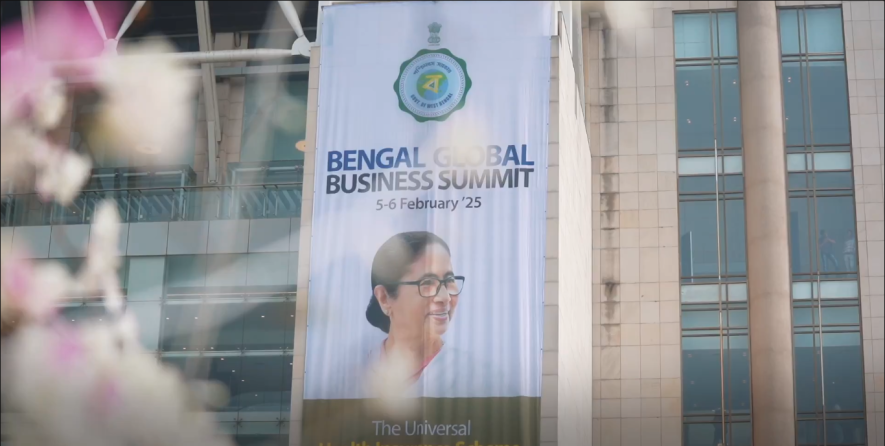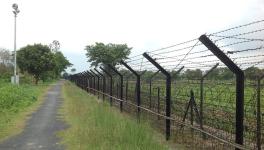BGBS-8 Betrays Mamata’s Frantic Effort to Woo Investments

Image Courtesy: Twitter/@MamataOfficial
Kolkata: “I am extremely happy”, remarked Mamata Banerjee, West Bengal Chief Minister and chairperson of the ruling Trinamool Congress (TMC), at the conclusion of the two-day eighth edition of Bengal Global Business Summit (BGBS) held here February 5 and 6. It is customary for states holding business conclaves as part of their industrialisation efforts to thank participants, particularly those who sign MoUs (memoranda of understanding) and LoIs (letters of intent).
The Chief Minister said she was happy because BGBS-8 had spawned investment proposals worth Rs 4.41 lakh crore, against Rs 3.73 lakh crore at BGBS-7 held in 2023 and the total of Rs 19 lakh crore plus from seven conclaves between 2015 and 2023.
This year, BGBS-8 stood out because the value of the investment proposals was the highest since Banerjee embarked upon the exercise in 2015 – the fourth year of her first term as Chief Minister.
In addition to claiming huge success of the latest drive, the state government emphasised that “our efforts are to generate more and more employment”. Also, in a break with the past, the Chief Minister claimed after the event on February 6 that out of the Rs 19 lakh crore worth proposals received in BGBS-1 to 7 till 2023, projects worth Rs 13 lakh crore “had been completed” and schemes worth Rs 6 lakh crore “were in the pipeline”.
But, even if the Chief Minister’s claims and remarks are taken at face value, there are strong reasons to question whether Bengal Assembly elections, due in April 2026, that is, some 14 months hence, are already weighing on her mind.
Some of her actions between February 4 and 6 suggested that she was trying hard to live down the Opposition’s charge and widely-shared public view that industrialisation had been a casualty in her regime, that the exodus of educated youths to other states for employment had been increasing, that ever-increasing outbound migration of unskilled and semi-skilled workers was a pointer to shrinking opportunities for earning livelihood and that the missing functional relationship with the Centre had been costing the state badly.
Funds for the 100-day rural job scheme – MGNREGS—have not been available for many months, as “glaring instances” of misuse and corruption were unearthed by the Central teams after on-the-spot investigation, Central funds for rural housing schemes had been withheld for a fairly long time for “non-compliance” with norms and procedural violations.
There are indications that the Central government is already keeping the April 2026 West Bengal Assembly election in view and, in its own way, is trying to embarrass the Chief Minister with instances of ‘non-cooperation’.
Two instances having bearing on the state’s economic development deserve mention. Toward the end of December 2024, Union Road Transport and Highways Minister Nitin Gadkari wrote to the Bengal Chief Minister seeking her intervention in respect of 11 highway projects that were facing “abnormal delays” due to pending approvals from district authorities for land acquisition, forest clearance, utility shifting etc. Also, nine highway projects were yet to move beyond the DPR (detailed project report) stage.
On February 3, 2025, two days after the presentation of the Union Budget, Railway Minister Ashwani Vaishnaw, for all practical purposes, accused the Chief Minister of non-cooperation with the ministry in the implementation of railway projects. He went as far as to suggest that often his ministry’s communications to the Chief Minister elicited no response. He has once again urged Banerjee to address land acquisition and law and order issues “so that benefits of the investments and projects reach citizens”.
The irony here is that in a majority of cases, the Railways own the land but those have been encroached and any drive by the Railways to recover the land invariably gives rise to law and order problems, which only the state government can handle. Banerjee has so far not reacted to the points raised by the Railway Minister.
In these circumstances, Mamata Banerjee is trying hard to establish that she is serious about industrialisation and employment generation. It was generally assumed that BGBS-8 would be the last such exercise before the Assembly elections. But to the surprise of the participants and, perhaps, even the Nabanna (state secretariat) top brass, she asked officers “to prepare for the next BGBS right from now”. This suggests that BGBS-9 before the April 2026 Assembly polls is a distinct possibility. The ‘first week of February’ schedule is maintainable, say informed quarters.
On the first day of BGBS-8, that is, February 5, Banerjee informed the gathering that “work on the big ticket Deocha Pachami coal mining venture in Birbhum district would begin as early as tomorrow”; by which she meant February 6 and despite some agitations by aggrieved land givers, the Birbhum district administration was ultimately able to carry out the Chief Minister’s strongly-worded directive by 9-30 p.m.
Commencement of work on the long-delayed Deocha Pachami coal mining project at this stage means removal of large quantities of over-burden (basalt and black stone), which may require 12-18 months and only thereafter the actual raising of coal can begin. The reality is that Banerjee wanted to give out a message to the gathering of a large number of industrialists and businessmen, and she did it.
Banerjee’s third action is more significant and, in a sense, marks a direct effort to mend relationships with the Tatas. On February 4 night, that is, a day before the commencement of BGBS-8, she spoke to Tata Sons chairman N Chandrasekaran, requested his presence at the conclave and urged him to arrange a regular flight from Kolkata to a destination in Europe. Chandrasekaran cited his preoccupation for not being able to make it to the conclave; but assured a visit later. He took note of Banerjee’s request for a direct flight from Kolkata to a destination in Europe.
It may be mentioned that Mamata Banerjee’s direct talks with the incumbent Tata Sons chairman came four months after Ratan Tata’s passing away (October 9, 2024) and 16 years after Bombay House pulled out (October 3, 2008) of the then 85% completed Singur small car unit after a relentless agitation led by Mamata Banerjee, then in the Opposition, against the land acquisition for the project in mid-2006. Recall that Ratan Tata had met late Buddhadeb Bhattacharya at Writers’ Building soon after he was sworn as chief minister, to inform him about the Group’s decision to locate the unit in West Bengal.
The state did receive a number of interesting investment proposals. But, BGBS-8 stood out for one particular announcement of the Chief Minister. This related to ONGC’s petroleum and gas exploration venture at Ashoknagar in 24 Parganas North, where exploration and related activity over the past four years or so had been successful.
Banerjee announced that the state government had decided to issue to ONGC the requisite petroleum mining lease, which would facilitate commercial production of petroleum and gas at Ashoknagar. Apparently, in a bid to convey her regime’s earnestness in helping the corporates, she said the state government had given 1,500 acres to ONGC for just Re 1. West Bengal thus, before long, would figure on the country’s petroleum and gas map, she added.
It may be mentioned that the Sajjan Jindal Group’s has expressed its intention to set up a 1,600 mw (800 mw X 2) super thermal power plant, Mukesh Ambani’s move to invest by 2030 “another 50,000 crore” in retail, telecom and data centre, Amul’s decision to set up “the world’s largest curd manufacturing plant with a capacity of 10 lakh kg per day” at the Sankrail Food Park in Howrah district at an investment of Rs 600 crore, Ambuja Group’s proposals to strengthen presence in real estate, hospitality and enter the healthcare segment in a big way.
ITC and RPG Sanjiv Goenka Group have, as usual, committed fresh investments. Sajjan Jindal has also expressed his desire to have a stake in Andal Airport. Interestingly, Banerjee has remained silent about the long-pending Tajpur deep sea port project.
The writer is an independent journalist based in Kolkata, West Bengal.
Get the latest reports & analysis with people's perspective on Protests, movements & deep analytical videos, discussions of the current affairs in your Telegram app. Subscribe to NewsClick's Telegram channel & get Real-Time updates on stories, as they get published on our website.
























